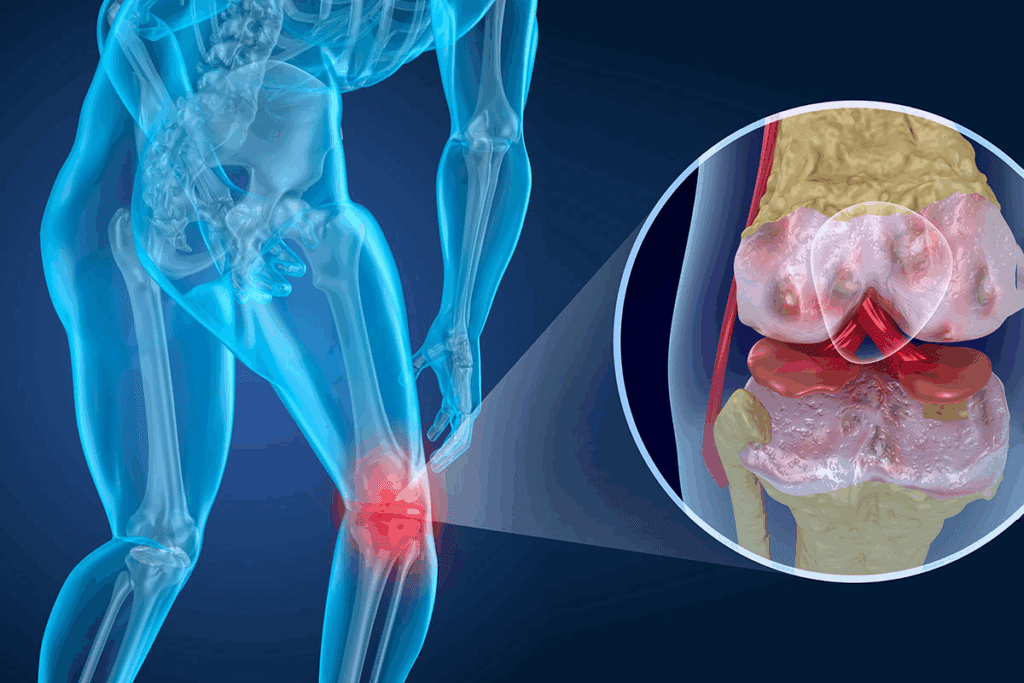Last Updated on November 4, 2025 by mcelik

Understanding the role of vitamins and minerals in joint health is crucial for effectively managing discomfort. Certain pain vitamins can help reduce inflammation and support healing in the joints.
Studies show that vitamins like D and C, along with minerals such as magnesium, play a key role in maintaining joint health. For example, a deficiency in vitamin D can worsen knee pain and other joint issues.
Learning about these pain vitamins and their role in knee, leg, and finger joint health is particularly important for women, helping them manage aches and improve overall mobility.

Looking into knee pain shows many possible reasons and fixes. It’s a common problem that can come from injuries, osteoarthritis, and not getting enough vitamins.
Knee pain hits both men and women, but the reasons differ. This is because of body differences, lifestyle, and hormones. Some common reasons include:
Knee pain and aching legs come from complex interactions. This involves bones, cartilage, ligaments, and muscles. When these tissues get inflamed or degenerate, it hurts. Knowing this helps find the right treatments, like vitamins for joint health.
Important factors include:
By tackling these issues, we see how vitamins and minerals help with knee pain and joint discomfort.

Understanding the role of vitamins and minerals in joint health is crucial for effectively managing joint pain.
A balanced diet is vital for maintaining healthy joints and preventing pain.
Understanding the role of vitamins and minerals in joint health is crucial for effectively managing joint pain.
Not getting enough vitamins can cause joint pain. For example, not enough vitamin D can lead to joint pain. Calcium and magnesium deficiencies can cause muscle cramps and joint pain too.
It’s important to know how vitamin deficiencies affect joints. This knowledge helps in finding the right treatments. We’ll dive deeper into this connection next.
| Vitamin/Mineral | Role in Joint Health | Deficiency Symptoms |
| Vitamin D | Essential for bone health | Joint pain, bone pain |
| Calcium | Supports bone structure | Muscle cramps, joint pain |
| Magnesium | Muscle function and relaxation | Muscle cramps, joint discomfort |
Understanding the role of vitamins and minerals in joint health is crucial for effectively managing joint pain. It’s important to get enough of these nutrients through food or supplements. This helps keep joints healthy.
Vitamin D is key for healthy joints and less knee pain. It helps keep bones strong, muscles strong, and overall health good.
Vitamin D helps keep bones and joints healthy by controlling calcium levels. Having enough Vitamin D can stop bone diseases like osteoporosis and osteopenia, which cause knee pain. It also helps muscles work better, reducing the chance of falls and injuries that hurt knees.
Many studies have looked at Vitamin D and knee pain. They found that people with knee pain and osteoarthritis often lack Vitamin D. Taking Vitamin D might help lessen knee pain and improve how well people can move. But, we need more research to know for sure.
| Study | Findings | Sample Size |
| Journal of Orthopaedic Research | Vitamin D supplementation reduced knee pain in deficient individuals. | 100 |
| Arthritis Care & Research | Low Vitamin D levels associated with increased knee pain and osteoarthritis. | 500 |
| Rheumatology International | Vitamin D receptor gene polymorphisms related to knee osteoarthritis susceptibility. | 200 |
Vitamin D deficiency shows up in different ways, like bone pain and weak muscles. Signs include constant pain in knees, hips, or lower back, muscle cramps, and a higher chance of breaking bones. In serious cases, it can cause rickets in kids and osteomalacia in adults. Spotting these signs early can help fix the problem before it gets worse.
Knowing how Vitamin D helps with knee pain is important for good treatment plans. Fixing Vitamin D levels can help ease knee pain and make life better overall.
Vitamin C is key for cartilage health and fighting inflammation. It’s a vital nutrient for healthy joints. We’ll see how it helps with collagen and the risks of too much.
Vitamin C is needed for making collagen, a key part of cartilage. Collagen makes cartilage strong and helps joints move smoothly. Vitamin C helps enzymes that make collagen stable.
Without enough vitamin C, collagen production drops. This can lead to joint pain and cartilage loss.
“Vitamin C is vital for collagen, a protein in our skin, bones, and connective tissue,” research shows. This makes vitamin C important for joint health.
Too much vitamin C might not directly cause joint pain. High doses are usually safe, but too much can upset your stomach. It’s best to talk to a doctor before taking supplements.
Eating foods high in vitamin C, like citrus fruits and leafy greens, is good for joints. It helps cartilage and fights inflammation without harm.
B vitamins are key for nerve health, helping to ease nerve pain from joint issues. B12, B6, and folate are vital for nerve function and joint health.
B vitamins support the nervous system and help make neurotransmitters that control pain. Vitamin B12 is important for making myelin, which protects nerve fibers. Without enough B12, you might feel numbness, tingling, and pain in your hands and feet.
Vitamin B6 helps reduce inflammation and keeps nerves healthy. Vitamin B9, or folate, works with B12 and B6 to keep nerves functioning well and prevent damage.
You can get these vitamins from food or supplements. Foods like lean meats, fish, eggs, dairy, and fortified cereals are good sources. Eating a diet rich in B vitamins can help manage nerve pain by supporting your nervous system.
“A well-balanced diet that includes foods rich in B vitamins can significantly impact nerve health and potentially reduce nerve pain associated with joint issues.”
Eating a variety of foods is key to getting enough B vitamins. Some top sources include:
If you’re not getting enough from food, supplements can help. But always talk to a healthcare provider first. They can help you figure out the right supplements and avoid any bad interactions with other medicines.
Understanding the role of vitamins and minerals in joint health is crucial for effectively managing joint pain.
Understanding the role of vitamins and minerals in joint health is crucial for effectively managing joint pain.
Vitamin E is a strong antioxidant that fights oxidative stress. This stress can damage joints and cause pain. Vitamin E neutralizes free radicals, protecting joints and helping with joint health and knee pain.
Key Benefits of Vitamin E for Joint Health:
Vitamin K is key for bone and cartilage health. It helps proteins that are important for bone and cartilage. Without enough vitamin K, the risk of osteoarthritis and other joint problems goes up.
| Vitamin | Role in Joint Health | Food Sources |
| Vitamin E | Antioxidant properties, combats oxidative stress | Nuts, seeds, vegetable oils |
| Vitamin K | Bone and cartilage metabolism | Leafy greens, fermented foods |
Understanding the role of vitamins and minerals in joint health is crucial for effectively managing joint pain.nts. This supports joint health and overall well-being.
Dealing with joint and muscle pain can be tough. A good strategy is to use different vitamins. This approach looks at nutrition, lifestyle, and supplements.
Using different vitamins together can make them work better. For example, Vitamin D and Calcium help bones. Vitamin C is key for collagen and fighting inflammation.
Combining vitamins can tackle joint health from many angles. B vitamins help nerves, which is good for pain from nerve damage.
Some vitamins are great for easing joint and muscle pain. Here are a few:
Knowing how these vitamins work can help you choose the right ones. This way, you can get the most relief from joint and muscle pain.
Healthy joints need a balance of minerals like calcium and magnesium. These minerals help with bone density and muscle function. They also play a part in reducing inflammation, which is important for managing joint pain.
Calcium is important for strong bones. It’s often taken to prevent osteoporosis and fractures. But, too much calcium can cause pain and stiffness in the joints.
Yet, enough calcium helps keep bones strong. This can help reduce joint pain by lowering the risk of osteoporosis and fractures. It’s important to find the right amount of calcium supplements with your doctor’s help.
Magnesium is also key for joint health. It has anti-inflammatory properties and helps with muscle and nerve health. A lack of magnesium might lead to more inflammation and a higher risk of arthritis.
Adding magnesium to your diet might ease arthritis symptoms. It can help reduce inflammation and improve muscle function. But, always talk to a doctor before starting magnesium supplements.
| Mineral | Role in Joint Health | Potential Effects of Deficiency |
| Calcium | Essential for bone density | Osteoporosis, increased risk of fractures |
| Magnesium | Anti-inflammatory properties, muscle function | Increased inflammation, muscle cramps, arthritis symptoms |
Understanding the role of vitamins and minerals in joint health is crucial for effectively managing joint pain.
Joint pain is not the same everywhere in the body. It can show up as aching knuckles, fingers, lower legs, knees, or at night. Knowing what nutrients each area needs is key to feeling better.
Aching knuckles and fingers can really get in the way. Vitamin C is important for healthy connective tissue. It can help ease pain in fingers and knuckles. Eating foods high in vitamin C, like citrus fruits and leafy greens, is a good start. Also, omega-3 fatty acids can help because they fight inflammation and reduce stiffness.
Pain in the lower legs and knees often comes from wear and tear. Vitamin D is vital for strong bones and can help with knee pain. Getting enough vitamin D from sunlight, supplements, or fortified foods is important. Magnesium also helps by reducing inflammation and improving joint function, which is great for knee health.
Nighttime joint pain can mess up your sleep and life quality. Some vitamins and minerals can help. Calcium and magnesium relax muscles and can lessen nighttime joint pain when taken before bed. Also, anti-inflammatory nutrients like turmeric and ginger can help manage pain that gets worse at night.
We look at supplements like glucosamine, chondroitin, and omega-3 fatty acids for joint health. They are known for helping with joint pain and inflammation. They can be used alone or with vitamins.
Glucosamine and chondroitin are found naturally in our bodies. They help keep cartilage healthy. Studies show they might help rebuild cartilage and ease joint pain.
Together, they might improve joint health and reduce pain from osteoarthritis.
Omega-3 fatty acids, like EPA and DHA in fish oil, fight inflammation. They help reduce joint inflammation and ease rheumatoid arthritis symptoms.
Key benefits of omega-3 fatty acids include:
Other than glucosamine, chondroitin, and omega-3 fatty acids, there are more supplements. These include:
These supplements are part of a full plan to manage joint pain and inflammation.
Vitamins are key for joint health, but lifestyle choices matter too. A healthy lifestyle boosts how well vitamins work for knee pain and joint health.
Exercise is vital for joint health and vitamin effectiveness. Activities like yoga, swimming, or cycling keep joints moving and muscles strong. Exercise helps nutrients and vitamins reach the joints, supporting their health.
“Exercise is a key component of joint health, and when combined with appropriate vitamin supplementation, it can significantly improve knee pain and overall well-being.”
Moving regularly throughout the day also helps. Simple actions like taking stairs or short walks can greatly benefit joint health.
Drinking enough water is essential for joint health and vitamin effectiveness. Water keeps the synovial fluid flowing, which lubricates joints and reduces friction. Proper hydration ensures vitamins and nutrients reach the joints, supporting their health.
To get the most from vitamins for knee pain, drink lots of water. Aim for at least eight glasses a day, adjusting based on activity and climate.
Combining a good vitamin plan with exercise and enough water can greatly improve joint health and reduce knee pain. This approach supports overall health and makes vitamins and supplements more effective.
A balanced diet is vital for maintaining healthy joints and preventing pain. Foods rich in vitamins and minerals can ease joint pain. They also support joint health overall.
An anti-inflammatory diet is key for joint pain management. It includes foods that lower body inflammation. Foods like salmon and sardines, rich in omega-3 fatty acids, are great for this.
Fruits and vegetables, packed with antioxidants, also help. Berries and leafy greens are good examples. They fight oxidative stress and inflammation.
Whole grains, like brown rice and quinoa, are also good. They’re full of fiber and nutrients. Eating these foods helps create an anti-inflammatory body environment. This is vital for healthy joints.
Some foods can make joint pain worse. Processed foods, sugary drinks, and foods high in saturated fats can trigger inflammation. Foods you’re sensitive or allergic to should also be limited.
Limit or avoid refined carbs and processed meats. White bread and hot dogs are examples. Reducing these foods can help lower inflammation and support joint health.
Choosing a diet rich in anti-inflammatory foods and low in harmful ones is beneficial. It helps maximize vitamin intake for better joint health.
Joint pain that lasts can mean there’s a bigger issue. It’s important to know when to get medical help. Some pain can be managed with lifestyle changes and supplements. But, sometimes you need a doctor to avoid bigger problems.
Some symptoms with joint pain are clear warnings. They mean you should see a doctor right away. These include:
If you notice any of these, get medical help fast. Early treatment can make a big difference. It can help with arthritis, infections, or injuries that need quick attention.
Managing joint pain with vitamins needs a team effort. Your healthcare provider can figure out why you’re in pain. They’ll suggest the right supplements for you. For example, vitamin D is key for bones, and a lack of it can cause joint pain.
Talk to your doctor before starting any supplements. Share your medical history, what meds you’re on, and any worries about your pain. They’ll guide you on the best vitamins and how much to take. This way, you get safe and effective treatment.
Also, keep up with regular check-ins with your doctor. They can see if the supplements are working. They can also tweak your plan if needed. This teamwork helps you get the best results and avoids risks.
Understanding the role of vitamins and minerals in joint health is crucial for effectively managing joint pain.
Adding vitamins to your diet can help a lot with knee pain relief. The top vitamins for this are Vitamin D, Vitamin C, and B vitamins. They help with cartilage, reduce swelling, and support nerves.
Other supplements for joint and muscle pain like glucosamine, chondroitin, and omega-3 fatty acids also help. A mix of a healthy diet, exercise, and the right supplements can ease knee pain and keep joint health in check.
Knowing how important nutrition and supplements are for joint health helps a lot. People can take steps to get knee pain relief and live better lives.
Vitamins D, C, E, and K, along with B vitamins, are key for joint health. Vitamin D is vital for bones, and vitamin C helps cartilage. These vitamins can ease knee pain.
Yes, not having enough vitamin D can lead to joint pain. Keeping vitamin D levels up is important for bone and joint health.
Vitamin C is important for making collagen, which keeps cartilage healthy. It also fights inflammation, which can lessen joint pain.
While vitamin C is good for joints, too much might cause problems for some. But it’s usually safe when taken in the right amounts.
B vitamins, like B12, B6, and folate, are good for nerves. They can help with pain from nerve issues in joints.
Calcium is key for strong bones, and magnesium helps muscles and reduces inflammation. Both are vital for healthy joints.
Yes, glucosamine and chondroitin can help rebuild cartilage and ease pain. Taking them together can offer more benefits.
Omega-3 fatty acids have strong anti-inflammatory effects. They can reduce inflammation and pain in joints.
Regular exercise, staying hydrated, and a healthy weight can improve joint health. These changes can also make vitamins work better.
An anti-inflammatory diet with fruits, veggies, whole grains, and healthy fats supports joints. Avoiding processed foods and sugars is also good.
If your joint pain is severe, doesn’t go away, or gets worse, see a doctor. They can find the cause and help you get better.
References
Subscribe to our e-newsletter to stay informed about the latest innovations in the world of health and exclusive offers!